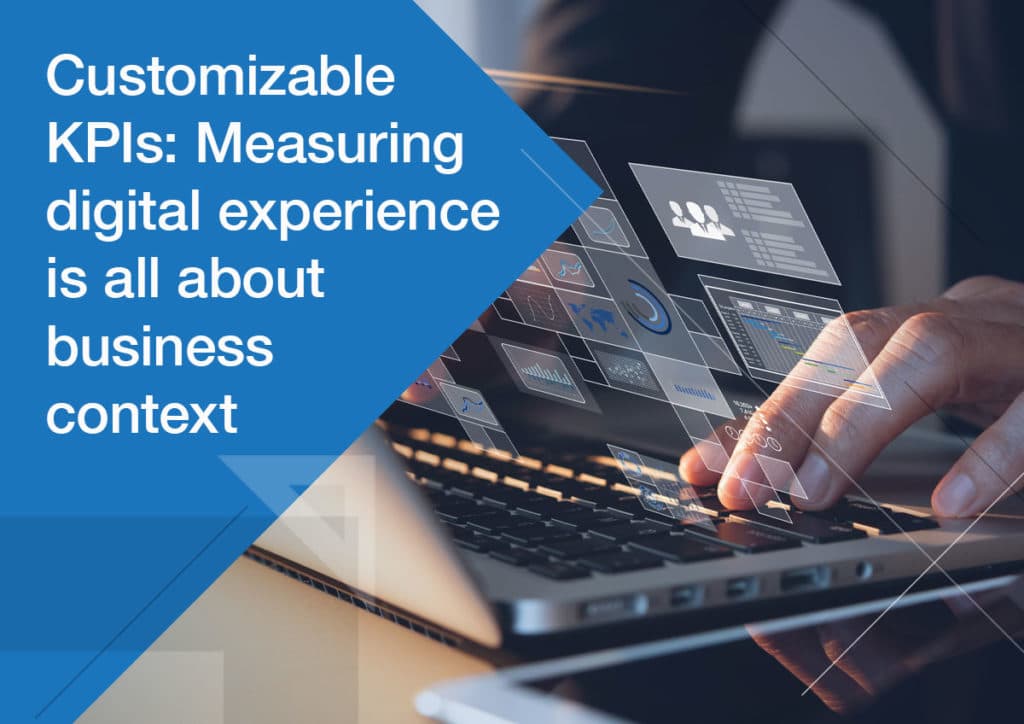Customizable KPIs: Measuring Digital Experience is All About Business Context
-
January 26, 2022
- Posted by: Pete Summers

Last year, the big focus for companies across all industries was establishing their hybrid working model. Now the basics of technologies that support hybrid working are in place, the spotlight in 2022 has shifted towards improving digital experience (DEX) so employees can reach peak effectiveness wherever they’re working.
The problem is that many organizations have no idea how to quantify and optimize digital experience. And even among the few companies that are measuring DEX, collecting the right data is still proving time consuming and challenging. Forrester reports that 57% of organizations say their DEX metrics are disaggregated through multiple platforms, which means they don’t have a comprehensive view of the entirety of the DEX.
A further issue is that measurements are often too generic, so fail to give the insights that individual companies need. That’s why at Scalable, we are in constant communication with our customers about measurement to ensure the outputs from our workplace analytics platform, Acumen, are always relevant to the context of their organization. Recently, we updated our KPI offerings in Acumen to give our users more customizable options, so they are always getting the metrics that are most meaningful to them. Check out two examples below.
“Software usage”
Our Software Usage KPI is designed to analyze the usage of both desktop and SaaS applications in an organization. The KPI is fully customizable, so users can focus on the specific apps that are relevant to their organization and are part of their digital transformation efforts.
For example, if you’re an engineering organization, and you want to drive adoption of a specific design app, you need data on how that app specifically is being used. Equally, you may only want to look at the uptake of that app by one specific team, rather than the organization as a whole.
Likewise, if your company wants to make Microsoft Teams its corporate standard channel for communications, then you want to be able to drill down into the usage of applications within Microsoft 365 in detail to see how and when your employees are using it.
“Time spent using self-help resources”
When employees are using self-help resources, they are more efficient, and they are not adding to the IT team’s burden by raising tickets that could be resolved with some simple self-service steps. This leaves IT free to focus on more on value-added activities. We know this is important to a lot of our Acumen user base.
But it’s not just important to identify the users that are using self-help resources, you also need to identify which resources are being used and where in your organization. Then you can use that insight to level-up other users in that area. Our KPI doesn’t just identify the users who attempt to solve their own problems, it can be customized to identify specific self-help resources that are being used – or that you want to promote usage of. For example, a knowledgebase, intranet site or self-help sections in SaaS apps. This means that teams can get a fuller picture of which resources are useful and are contributing to improving the employee experience.
Measurement needs context
Being able to successfully measure your employees’ digital experience depends on having the right metrics, measured in the right way. At Scalable Software, we know that organizations need actionable insights. They need to move away from the ‘data for data’s sake’ approach, and towards a model of measurement that is shaped by the priorities of an organization.
That’s why we allow our customers to select an appropriate scope for their KPIs – whether that’s looking at data across the whole organization or limiting by department, team location, or even by role. Acumen KPIs cover several business focus areas including cost optimization, employee experience, productivity optimization and risk mitigation.
Find out more about how Acumen can help boost your DEX.